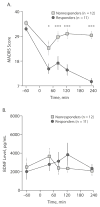Brain-derived neurotrophic factor and initial antidepressant response to an N-methyl-D-aspartate antagonist - PubMed (original) (raw)
Randomized Controlled Trial
. 2009 Dec;70(12):1662-6.
doi: 10.4088/JCP.08m04659. Epub 2009 Sep 8.
Affiliations
- PMID: 19744406
- PMCID: PMC2819547
- DOI: 10.4088/JCP.08m04659
Randomized Controlled Trial
Brain-derived neurotrophic factor and initial antidepressant response to an N-methyl-D-aspartate antagonist
Rodrigo Machado-Vieira et al. J Clin Psychiatry. 2009 Dec.
Abstract
Objective: A model has been proposed to explain the pathophysiology of mood disorders based on decreased neurotrophin levels during mood episodes; treatment with antidepressants and mood stabilizers is associated with clinical improvement. This study investigated whether changes in brain-derived neurotrophic factor (BDNF) levels are associated with the initial antidepressant effects of ketamine, a high-affinity N-methyl-D-aspartate (NMDA) antagonist.
Method: Twenty-three subjects aged 18 to 65 years with DSM-IV major depressive disorder (treatment resistant) participated in this study, which was conducted between October 2006 and May 2008. The subjects were given an open-label intravenous infusion of ketamine hydrochloride (0.5 mg/kg) and rated using various depression scales at baseline and at 40, 80, 120, and 230 minutes postinfusion. The primary outcome measure was the Montgomery-Asberg Depression Rating Scale score. BDNF levels were obtained at the same time points as depression rating scale scores.
Results: Despite a significant (P <. 001) improvement in MADRS scores after subjects received ketamine treatment, no changes in BDNF levels were observed in subjects after they received ketamine compared to baseline. Also, no association was found between antidepressant response and BDNF levels.
Conclusions: This study demonstrates that ketamine's rapid initial antidepressant effects are not mediated by BDNF. Further studies are necessary to shed light on the neurobiological basis of these effects.
Trial registration: clinicaltrials.gov Identifiers: NCT00024635 and NCT00088699.
Copyright 2009 Physicians Postgraduate Press, Inc.
Figures
Figure 1
BDNF Values and MADRS Scores Over 230 Minutes in Subjects With Major Depressive Disorder (treatment resistent) who Did and Did Not Respond to ketamine (N=23) *p<.05, ***p<.001 after Bonferroni correction. Abbreviations: BDNF = brain derived neurotrophic factor, MADRS = Montgomery-Asberg Depression Rating Scale.
Similar articles
- A randomized trial of an N-methyl-D-aspartate antagonist in treatment-resistant major depression.
Zarate CA Jr, Singh JB, Carlson PJ, Brutsche NE, Ameli R, Luckenbaugh DA, Charney DS, Manji HK. Zarate CA Jr, et al. Arch Gen Psychiatry. 2006 Aug;63(8):856-64. doi: 10.1001/archpsyc.63.8.856. Arch Gen Psychiatry. 2006. PMID: 16894061 Clinical Trial. - Rapid resolution of suicidal ideation after a single infusion of an N-methyl-D-aspartate antagonist in patients with treatment-resistant major depressive disorder.
DiazGranados N, Ibrahim LA, Brutsche NE, Ameli R, Henter ID, Luckenbaugh DA, Machado-Vieira R, Zarate CA Jr. DiazGranados N, et al. J Clin Psychiatry. 2010 Dec;71(12):1605-11. doi: 10.4088/JCP.09m05327blu. Epub 2010 Jul 13. J Clin Psychiatry. 2010. PMID: 20673547 Free PMC article. Clinical Trial. - Family history of alcohol dependence and initial antidepressant response to an N-methyl-D-aspartate antagonist.
Phelps LE, Brutsche N, Moral JR, Luckenbaugh DA, Manji HK, Zarate CA Jr. Phelps LE, et al. Biol Psychiatry. 2009 Jan 15;65(2):181-4. doi: 10.1016/j.biopsych.2008.09.029. Epub 2008 Nov 8. Biol Psychiatry. 2009. PMID: 18996507 Free PMC article. Clinical Trial. - Ketamine: The final frontier or another depressing end?
Sial OK, Parise EM, Parise LF, Gnecco T, Bolaños-Guzmán CA. Sial OK, et al. Behav Brain Res. 2020 Apr 6;383:112508. doi: 10.1016/j.bbr.2020.112508. Epub 2020 Feb 1. Behav Brain Res. 2020. PMID: 32017978 Free PMC article. Review. - Overlap in the neural circuitry and molecular mechanisms underlying ketamine abuse and its use as an antidepressant.
Kokane SS, Armant RJ, Bolaños-Guzmán CA, Perrotti LI. Kokane SS, et al. Behav Brain Res. 2020 Apr 20;384:112548. doi: 10.1016/j.bbr.2020.112548. Epub 2020 Feb 13. Behav Brain Res. 2020. PMID: 32061748 Free PMC article. Review.
Cited by
- Tramadol reinforces antidepressant effects of ketamine with increased levels of brain-derived neurotrophic factor and tropomyosin-related kinase B in rat hippocampus.
Yang C, Li X, Wang N, Xu S, Yang J, Zhou Z. Yang C, et al. Front Med. 2012 Dec;6(4):411-5. doi: 10.1007/s11684-012-0226-2. Epub 2012 Nov 3. Front Med. 2012. PMID: 23124884 - Measurement methods of BDNF levels in major depression: a qualitative systematic review of clinical trials.
Teche SP, Nuernberg GL, Sordi AO, de Souza LH, Remy L, Ceresér KM, Rocha NS. Teche SP, et al. Psychiatr Q. 2013 Dec;84(4):485-97. doi: 10.1007/s11126-013-9261-7. Psychiatr Q. 2013. PMID: 23564563 Review. - Ketamine for Depression: Advances in Clinical Treatment, Rapid Antidepressant Mechanisms of Action, and a Contrast with Serotonergic Psychedelics.
Kojic M, Saelens J, Kadriu B, Zarate CA Jr, Kraus C. Kojic M, et al. Curr Top Behav Neurosci. 2022;56:141-167. doi: 10.1007/7854_2022_313. Curr Top Behav Neurosci. 2022. PMID: 35312993 Free PMC article. - Novel glutamatergic agents for major depressive disorder and bipolar disorder.
Machado-Vieira R, Ibrahim L, Henter ID, Zarate CA Jr. Machado-Vieira R, et al. Pharmacol Biochem Behav. 2012 Feb;100(4):678-87. doi: 10.1016/j.pbb.2011.09.010. Epub 2011 Sep 25. Pharmacol Biochem Behav. 2012. PMID: 21971560 Free PMC article. Review. - Rapamycin blocks the antidepressant effect of ketamine in task-dependent manner.
Holubova K, Kleteckova L, Skurlova M, Ricny J, Stuchlik A, Vales K. Holubova K, et al. Psychopharmacology (Berl). 2016 Jun;233(11):2077-2097. doi: 10.1007/s00213-016-4256-3. Epub 2016 Mar 23. Psychopharmacology (Berl). 2016. PMID: 27004790
References
Publication types
MeSH terms
Substances
LinkOut - more resources
Full Text Sources
Medical
